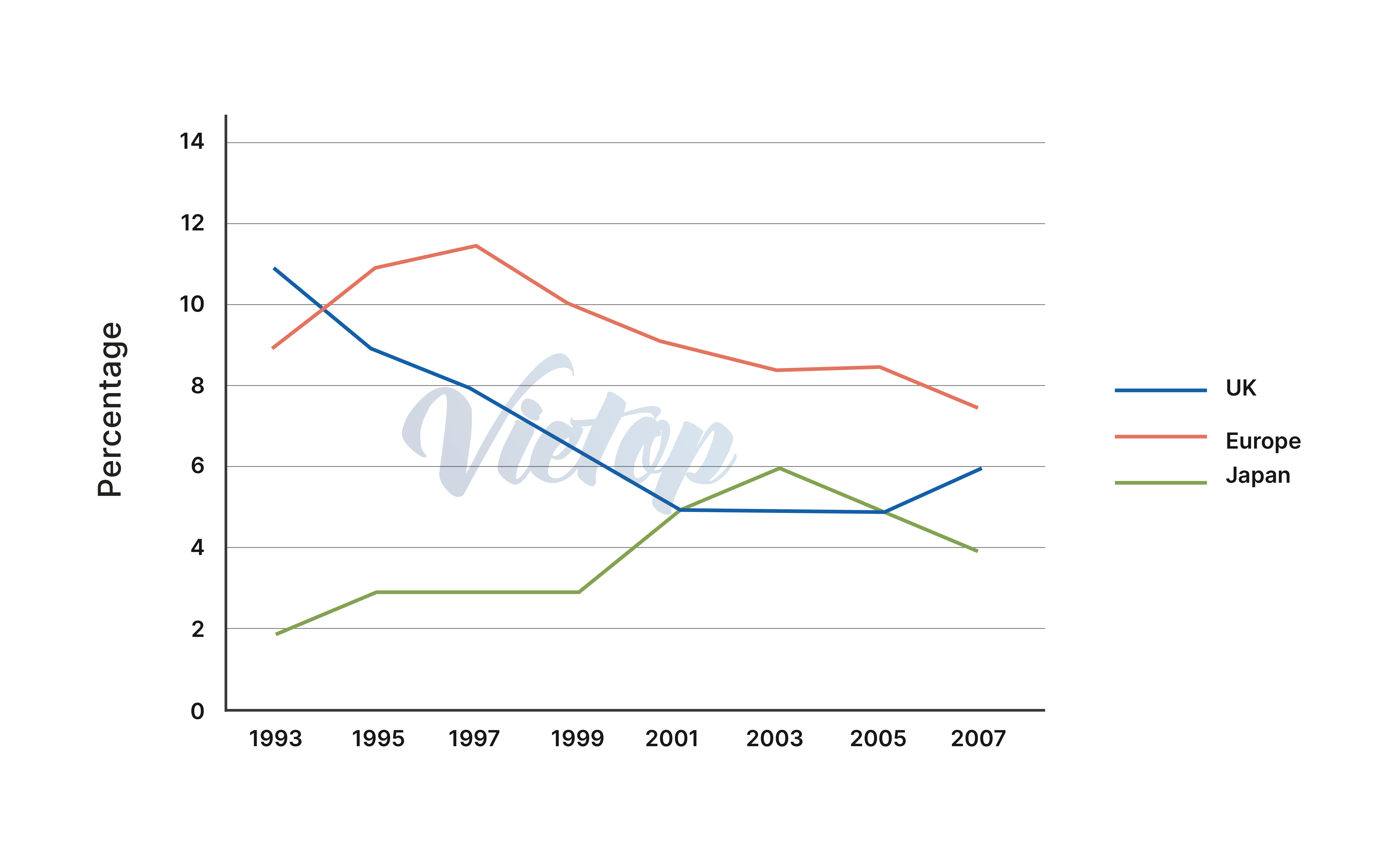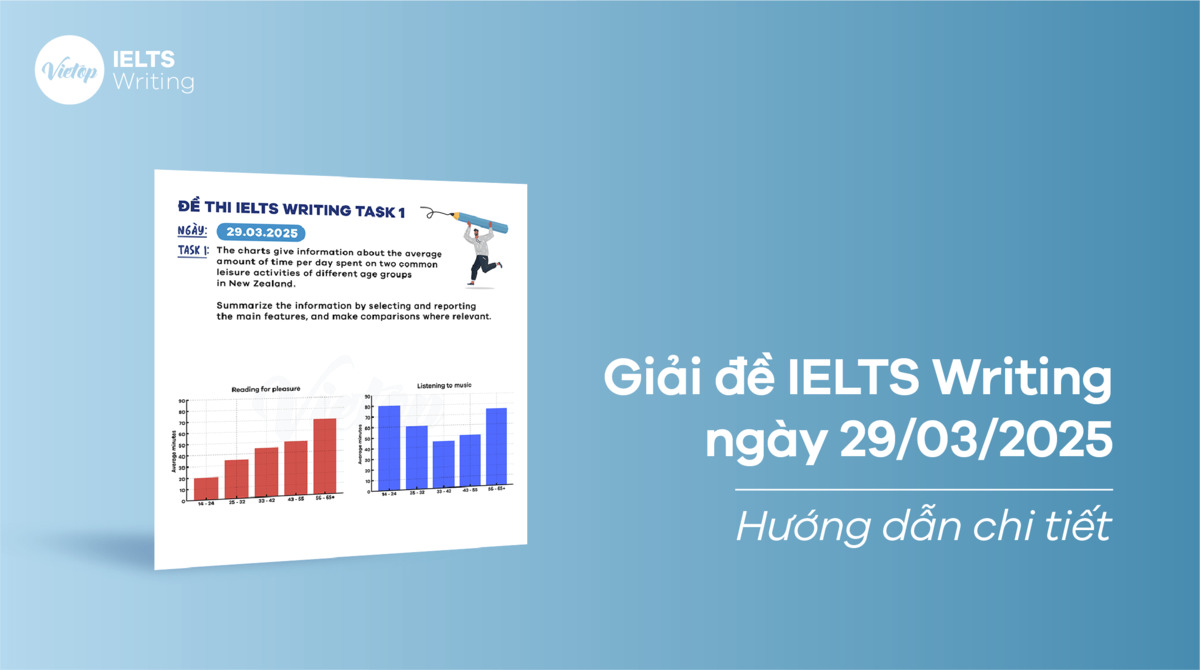Trong bài viết sau, thầy/ cô sẽ gửi đến bạn cách giải đề IELTS Writing ngày 24/02/2024 chi tiết qua:
- Lập dàn ý và phân tích bảng.
- Các bài mẫu cho từng band điểm.
- Tổng hợp từ vựng và cấu trúc quan trọng.
Cùng tham khảo ngay để luyện tập thêm thật kỹ bạn nhé!
IELTS Writing task 1
The graph depicts unemployment rates in the United Kingdom, the rest of Europe and Japan from 1993 to 2007.

Bước 1: Lập dàn ý
Đoạn tổng quan: Mặc dù có một số biến động, tỷ lệ thất nghiệp ở châu Âu và Vương quốc Anh đã giảm, với châu Âu trải qua một sự giảm mạnh, trong khi có sự tăng lên trong số liệu của Nhật Bản, mặc dù có một sự giảm vào cuối giai đoạn. Cũng đáng chú ý rằng châu Âu nói chung là quốc gia chiếm ưu thế về tỷ lệ người thất nghiệp, trong khi tình trạng việc làm của Nhật Bản có xu hướng tích cực nhất, trừ giai đoạn từ 2001 đến 2005.
| Thân bài 1 | Thân bài 2 |
| Tỷ lệ người không có việc làm ở châu Âu bắt đầu ở mức khoảng 7%, sau đó tăng lên đến đỉnh điểm của mình vào năm 1997 với gần 12%. Tuy nhiên, từ điểm này trở đi, nó giảm hầu như liên tục và đến năm cuối cùng đã giảm xuống dưới 8%. Một xu hướng giảm, mặc dù theo hình mẫu ngược lại, đã được thấy ở châu Âu, với tỷ lệ thất nghiệp giảm đột ngột từ khoảng 11% vào năm 1993 xuống đến mức thấp nhất của mình khoảng 5% trong tám năm tiếp theo. Sau đó, con số duy trì ổn định trước khi trải qua một sự tăng tối thiểu lên 6% trong năm cuối cùng. | Khoảng 2% người không có việc làm ở Nhật Bản trong năm đầu tiên, theo sau là sự ổn định giữa 1995 và 1999 và một sự tăng mạnh sau đó, vượt qua dữ liệu của Vương quốc Anh giữa 2001 và 2005. Đáng chú ý, vào năm 2003, quốc gia này ghi nhận số lượng lớn người thất nghiệp nhất, với 6% dân số không thể tìm thấy việc làm, tuy nhiên mức này chỉ kéo dài trong thời gian ngắn, giảm dần và kết thúc giai đoạn với gần 4%. |
Bước 2: Hoàn thành bài luận
The graph shows how the percentage of unemployed people changed in three countries over a course of 14 years between 1993 and 2007.
Overall, despite some fluctuations, unemployment rates in Europe and the UK saw declining trends, with Europe experiencing a sharper decline, whereas there was an increase in the figures for Japan, despite a drop towards the end of the period. It is also noticeable that Europe was generally the dominant country in terms of joblessness, whereas Japan’s employment status tended to be the most positive, with the exception of the period from 2001 to 2005.
The proportion of people without a job in Europe started at roughly 7%, after which it saw a growth to its peak of just under 12% in 1997. However, from this point onwards, it declined almost continually, and by the final year had fallen to a little below 8%. A decreasing trend, albeit in a reverse pattern and at a far lower level, was seen in the UK, whose unemployment rates dropped dramatically from around 11% in 1993 to its lowest point of roughly 5% over the following eight years. The figures then remained unchanged before experiencing a minimal growth to 6% in the last year.
Around 2% of people were out of job in Japan in the first year, followed by a stability between 1995 and 1999 and a subsequent sharp growth to overtake the data for the UK between 2001 and 2005. Notably, in 2003, this country recorded the greatest number of unemployed people, with 6% of residents in this country being unable to find employment, although this level was short-lived, as it dropped gradually, eventually ending the period at almost 4%.
Xem thêm:
- [ACE THE TEST] Giải đề IELTS Writing ngày 17/02/2024
- [ACE THE TEST] Giải đề IELTS Writing ngày 27/01/2024
- [ACE THE TEST] Giải đề IELTS Writing ngày 18/01/2024
IELTS Writing task 2
Parents are putting a lot of pressure on their children to succeed. What are the reasons for this? Is it a positive or negative development?
Bước 1: Phân tích đề
- Từ khoá: Parents, pressure, children, succeed
- Câu hỏi: Đề bài yêu cầu thí sinh đưa ra nguyên do và xác định đây là khuynh hướng phát triển tích cực hay tiêu cực
Bước 2: Lập kế hoạch cho bài luận
| Thân bài 1 | Thân bài 2 |
| Topic Sentence: Two primary reasons drive parental pressure on children. Supporting Ideas: – Parents invest heavily in children’s education, including selling property for tuition fees. – Societal norm ties family status to the success of children, adding pressure for parents to ensure their children succeed. | Topic Sentence: Parental pressure has both positive and negative consequences. Supporting Ideas: – Positive – Academic pressure motivates children to focus on goals, leading to success and excellence. – Positive – Children with supportive parents often achieve financial and professional success faster. – Negative – Excessive pressure hampers children’s leisure and enjoyment, impacting holistic development. – Negative – Cases of severe consequences, such as self-harm or suicide, have been reported due to overwhelming pressure. |
Bước 3: Hoàn thành bài luận
It has become increasingly prevalent for parents to impose an enormous amount of pressure on their children for the sake of their success. Such a prevalence could be attributed to two main reasons, and in my opinion, it can be regarded as a desirable development, on condition that it is well managed.
There are two primary explanations as to why almost all children are forced to obtain success by their parents. Firstly, the majority of parents tend to invest a huge sum of money in their children’s education, which takes approximately fewer than twenty years in most countries, and some families from underprivileged groups of society have even gone as far as to sell their owned houses and property so as to be able to afford exorbitant tuition fees, especially those of tertiary level. Given such a heavy investment, it is reasonable for parents to ensure that their children study properly, apply themselves to their studies and gain essential knowledge and skills which stand them in good stead for their future career prospects. In this way, valuable financial resources would not be wasted. In addition to this, there is a widely recognized societal norm that the social status of one’s family is judged not by the success or accumulation of wealth of parents, but by how successful the child or children of that family are. In other words, in a family where children succeed in life, bring great fortune and reciprocate their parents’ devotion, they are more likely to receive respect and admiration from others, thereby contributing significantly to parents’ sense of pride and life satisfaction, whereas families with children who are still struggling financially tend to leave a poor image on others and in worst cases, come in for criticism and condemnation.
On the one hand, as children are constantly pushed to excel academically, this could serve as a source of motivation for them to focus on achieving their goals, and strive for success and excellence, otherwise they are likely to be demotivated and fall into plenty of unhealthy temptations from the outside world, given how impressionable most children are at this stage of life. Another significant benefit is that children whose parents deeply care about their education and encourage them to try harder appear to become financially and professionally successful much faster and far outperform their counterparts, who live with parents who pay scant attention to their children’s learning progress and academic performance. That said, excessive pressure is not without its troubles. Many parents have forced their children to study too intensively, and this unquestionably comes at the expense of children’s leisure time and enjoyment of life. There is no denying that holistic development in children necessitates not only intellectual stimulation but also mental health and opportunities for recreational and play-based activities. In the worst-case scenarios, there have been numerous reports in the media in which children, who cannot handle the pressure placed on them, resort to self-harm or even commit suicide so that they can permanently escape from unattainable expectations of parents.
In conclusion, as parents need to make sure they reap benefits from what they have financially sacrificed, and conform to societal norms and expectations, a significant portion of them pressurize their children into succeeding in the future, and from my perspective, the challenge lies in parents keeping their pressure under control, so that they can fully harness the positive aspects while mitigating the potential consequences.
Giáo dục và gia đình là một trong những chủ đề phổ biến thường xuất hiện trong bài thi IELTS Writing task 2, yêu cầu thí sinh phải trau dồi kiến thức để có nhiều góc nhìn khi bàn luận về các vấn đề xã hội. Trong khoá học IELTS 7.0, các bạn sẽ được xây dựng tư duy logic trong phân tích đề và phát triển ý tưởng chuyên sâu như bài mẫu giải đề thực tế trong bài viết
Bước 4: Từ vựng
| Vocabulary | Meaning in Vietnamese |
| Accumulation of wealth | Sự tích lũy của của cải |
| Reciprocate | Đáp lại, đền đá |
| Excel academically | Xuất sắc trong học thuật |
| Comes at the expense of | Đi kèm với sự hy sinh hoặc tổn thất |
| Intellectual stimulation | Sự kích thích trí tuệ |
| Unattainable expectations | Kỳ vọng không thể đạt được |
| Conform to societal norms | Tuân theo các quy tắc xã hội, đúng theo các quy chuẩn xã hội |
Gap-fill Exercise:
- 1. The _______________ of wealth often requires careful financial planning and investment.
- 2. In a healthy relationship, it’s essential for both partners to _______________ each other’s efforts and kindness.
- 3. Many students strive to _______________ academically by dedicating extra time to study and research.
- 4. Pursuing a high-powered career often _______________ personal time and family commitments.
- 5. Educational programs should provide a balance of _______________ to engage students’ minds effectively.
- 6. Setting _______________ for perfection in every aspect of life can lead to stress and disappointment.
- 7. It is important to teach children to _______________ societal norms while encouraging individuality.
Answers:
- 1. Accumulation of wealth
- 2. Reciprocate
- 3. Excel academically
- 4. Comes at the expense of
- 5. Intellectual stimulation
- 6. Unattainable expectations
- 7. Conform to societal norms
Hy vọng bài giải đề IELTS Writing ngày 24/02/2024 đã cung cấp thêm cho bạn nhiều từ vựng, cấu trúc và ý tưởng để vận dụng cho bài viết của mình khi luyện thi IELTS. Chúc bạn thi IELTS tốt!
Ngoài ra, các bạn cần phải thường xuyên cập nhập lịch thi IELTS để có kế hoạch ôn thi IELTS phù hợp nhé!


![[ACE THE TEST] Giải đề IELTS Writing ngày 07/04/2025](https://vietop.edu.vn/wp-content/uploads/2025/04/giai-de-ielts-writing-ngay-07-04-2025.png)

![[ACE THE TEST] Giải đề IELTS Writing ngày 15/03/2025](https://vietop.edu.vn/wp-content/uploads/2025/03/giai-de-ielts-writing-ngay-15-03-2025.jpg)
![[ACE THE TEST] Giải đề IELTS Writing ngày 22/03/2025](https://vietop.edu.vn/wp-content/uploads/2025/03/giai-de-ielts-writing-ngay-22-03-2025.jpg)
![[ACE THE TEST] Giải đề IELTS Writing ngày 08/03/2025](https://vietop.edu.vn/wp-content/uploads/2025/03/giai-de-ielts-writing-ngay-08-03-2025.jpg)
![[ACE THE TEST] Giải đề IELTS Writing ngày 06/03/2025](https://vietop.edu.vn/wp-content/uploads/2025/03/giai-de-ielts-writing-ngay-06-03-2025.jpg)
![[ACE THE TEST] Giải đề IELTS Writing ngày 22/02/2025](https://vietop.edu.vn/wp-content/uploads/2025/02/giai-de-ielts-writing-ngay-22-02-2025.jpg)
